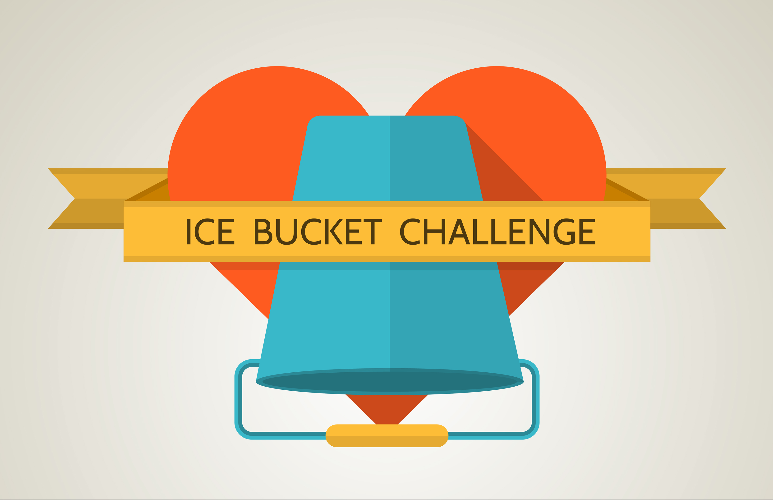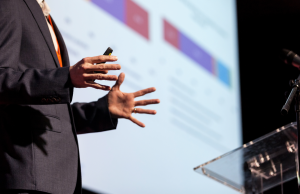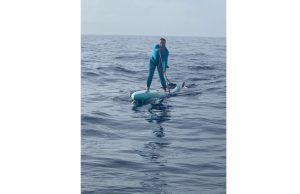For Nancy Frates, like most people, the first thing that came to mind about ALS was that it was bad and that Lou Gehrig had it.
The reaction of her then-27-year-old son, Pete, to his diagnosis still rings in her ears. “‘We’re going to get to work. We’re going to change the trajectory of this disease. What an opportunity we’ve been given to change the world.’ There were lots of words I’d use but opportunity was not one of them,” Nancy Frates said during her keynote at the annual ANA DC Nonprofit Conference.
The CEO of Team Frate Train, Frates presented “Don’t Be Afraid to Be Great Through Adversity, Resilience, and Triumph,” on Friday as part of the conference at The Mayflower Hotel in Washington, D.C. She described how her son and family used their personal networks and social media to eventually create the viral sensation Ice Bucket Challenge during the summer of 2014 and what it’s done for ALS research.
Frates recalled being livid when doctors told her there’s been virtually no progress in the fight against ALS, with no treatment or cure, and the prognosis was 2 to 5 years. Yet they told her son to come back in three months. “That’s when reality hit me right in the face,” she said. Doctors said there’s nothing they can do, they only wanted Pete to come back to see how far he’s progressed. “I remember thinking, ‘This is unacceptable,’” Frates said.
What they did have, Frates said, was the power of their family, their inspiration in Pete, and a mission — to change the status of the disease space. “The most important thing: we had treasure,” Frates said, and that was the circles of friends that Pete during years playing on baseball teams — all the way up to Division I Boston College — as well as Pop Warner football and hockey, as well as classmates. Pete was an early adopter of social media.
In 2014, Pete received a video of the Ice Bucket Challenge from another ALS patient, Pat Quinn of Yonkers, N.Y. That’s when it clicked for him, Frates said.
ALS is a visual disease. Pete knew he’d lose some function each day. “He had to tell the world, if it can happen to me, it can happen to you,” Frates said.
Ice Bucket Challenge videos were viewed more than 10 billion times in six weeks. YouTube reported that people in 150 countries uploaded their efforts. At its peak, the Ice Bucket Challenge raised $11 million in one day and worldwide raised $220 million.
At times, the challenge was derided as “selfie-ism,” Frates said. “We decided to market a disease, not a charity,” she said, because they were trying to build awareness around ALS.
People not only opened their wallets, they opened their hearts and minds, Frates said. Between January and July of 2014, the ALS page on Wikipedia.org averaged about 135 hits per day. In August of that year, it reached 3 million hits, and ALS was the most searched term on Google during 2014.
The ALS Association (ALSA) acquired 2.4 million new donors during the Ice Bucket Challenge. “This was going directly to ALS websites,” Frates said, because there were no Facebook Fundraisers yet. The challenge turned out to be a catalyst for Facebook to develop its fundraisers, she said.
ALSA was a $26-million nonprofit that had $115 million dropped on them in one month. “Are you prepared? Because the next Ice Bucket Challenge could be right around the corner,” Frates told fundraisers. “We didn’t have the right CRM in place. Donor retention was 0 percent. Literally we are starting from scratch,” she said.
“In the world of disease, it’s the results that count,” Frates said. She noted that the ALS Association leveraged $89 million in research grants to raise another $100 million, and now scientists have more than $200 million with which to work. Before 2014, researchers found one new major gene in the ALS space, according to Frates. Since then, they’ve found five.
“Cultivate and value relationships. You never know when you’ll call on those relationships to help you. That is what changed the world,” Frates said.
“When you’re present in life, you’ll capture those opportunities as they come to you,” she said. The Ice Bucket Challenge was around eight months before it exploded in August 2014. “Some people at your nonprofit probably did it. My son identified an opportunity and committed to a mission. He grabbed it and made his own,” Frates said.
Pete died this past December, a few weeks shy of his 35th birthday. The Peter Frates Family Foundation will help ALS patients with home health costs.
Frates shared her son’s affirmation: Be passionate; be genuine; be hardworking, and don’t ever be afraid to be great. “Especially in nonprofits, these words ring so true,” she said. “Remember this one word: We give hope. And that’s the greatest gift of all.”









